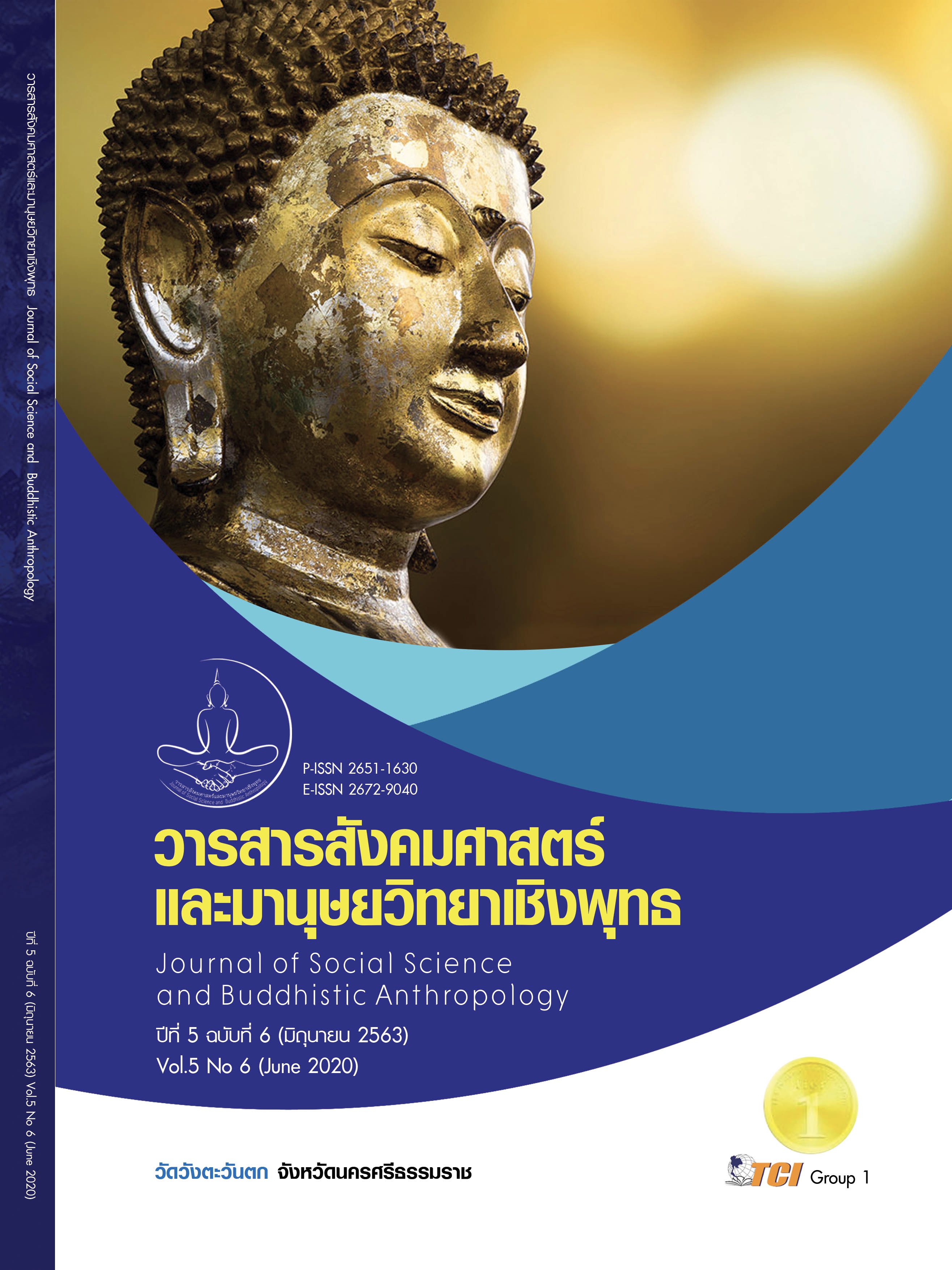BEHAVIOR FOR APPLICATION OF TRI - SIKHA IN LIVING OF STUDENT IN MAHAMAKUT BUDDHIST UNIVERSITY SRITHAM - MASOKARAJ CAMPUS
Keywords:
Behavior, The Threefold Principles, The Way of Living of StudentAbstract
This research article aim to study the behavior of applying the threefold principles in the life of students at Mahamakut Buddhist University Srithammasokraj Campus. To compare the behavior of applying the threefold principles in the daily life of students with different sex, age, disciplines and educational levels. To study about the way of living suggestions of students of Mahamakut Buddhist University Srithammasokraj Campus which is be the quantitative Research, Methods of conducting population research are students of Mahamakut Buddhist University Srithammasokraj Campus, 575 images / person. The sample groups were compared by using Krejcie and Morgan table to obtained a sample of 226 images / person. The tools that used in this research, the statistic that used to find the tools quality are Index of item–Objective Congruence : IOC and Reliability of questionnaire by means of Cronbach’s Alpha Coefficient, Calculate frequency, percentage, mean, standard deviation, t-test and F-test for pairing differences. The research found that 1) The behavior of using the threefold principles in life is at a high level. 2) The comparison results of applying threefold principles in life. For gender is not different. But Age is difference with significant at .05 level. The faculty with different studies differ significantly at the level of .001, Different educational levels were statistically significant at the .001 level. Suggestions for precepts can be observed on certain occasions consistently. For the concentration, Cannot control self emotional when face to the problem. As for intelligence, it is stuck in a world that does not understand the process of suffering and cannot solve problems.
References
ขวัญษา เอกจิตร และอุทัย สติมั่น. (2559). หลักไตรสิกขากับการพัฒนาตน. วารสารครุศาสตร์ปริทรรศน์, 3(2), 170 - 179.
ฐานสุขวรรณา วงษ์สุภาพงษ์. (2555). การนำหลักไตรสิกขาไปใช้ในชีวิตประจำวันของนักเรียนชั้นประถมศึกษาปีที่ 4 – 6 โรงเรียนเทศบาล 1 จังหวัดนครนายก. ใน วิทยานิพนธ์พุทธศาสตรมหาบัณฑิต สาขาวิชาบริหารการศึกษา. มหาวิทยาลัยมหาจุฬาลงกรณราชวิทยาลัย.
เดชชาติ ตรีทรัพย์ และคณะ. (2559). กานนำหลักไตรสิกขามาใช้ในชีวิตประจำวันของประชาชนเทศบาล ตำบลไม้เรียง อำเภอฉวาง จังหวัดนครศรีธรรมราช. วารสารมหาจุฬานาครทรรศน์, 3(2), 14 - 26.
พระชาติชาย บุญบาล. (2549). การเปรียบเทียบผลสัมฤทธิ์ทางการเรียนและการใช้เหตุผลเชิงจริยธรรมของนักเรียนชั้นประถมศึกษาปีที่ 5 กลุ่มสาระการเรียนรู้สังคมศึกษา ศาสนาและวัฒนธรรม เรื่องเบญจศีลที่สอนตามวิธีสอนแบบไตรสิกขากับแบบโยนิโสมนสิการ. ใน วิทยานิพนธ์ครุศาสตรมหาบัณฑิต สาขาวิชาหลักสูตรและนวัตกรรมการจักการเรียนรู้. มหาวิทยาลัยราชภัฏเทพสตรี.
พระพรหมคุณาภรณ์ (ป.อ. ปยุตฺ โต). (2552). พุทธธรรม ฉบับปรับปรุงและขยายความ. กรุงเทพมหานคร: มหาวิทยาลัยมหาจุฬาลงกรณราชวิทยาลัย.
พระมหาทองล้อม สุเมโธ (อินทะสร้อย). (2558). การประยุกต์ใช้หลักไตรสิกขาในการพัฒนาสามเณรนักเรียนต้นแบบของโรงเรียนพุทธโกศัยวิทยา จังหวัดแพร่. ใน วิทยานิพนธ์พุทธศาสตรมหาบัณฑิต สาขาวิชาพระพุทธศาสนา. มหาวิทยาลัยมหาจุฬาลงกรณราชวิทยาลัย.
พระสุเมธ สุเมโธ. (นภดลจินดา). (2553). การศึกษาเปรียบเทียบบทบาทในการส่งเสริมพระพุทธศาสนาของนักธุรกิจ ในสมัยพุทธกาลกับปัจจุบัน : ศึกษาเฉพาะกรณี ดร.บุญยง ว่องวานิช. ใน วิทยานิพนธ์พุทธศาสตรบัณฑิต สาขาวิชาพุทธศาสนา. มหาวิทยาลัยมหาจุฬาลงกรณราชวิทยาลัย.
พระอดิเทพ อธิวณฺโณ. (2560). การใช้หลักไตรสิกขาในการพัฒนาคุณลักษณะที่พึงประสงค์ของนักเรียนชั้นมัธยมศึกษาตอนปลาย โรงเรียนท่าชนะ จังหวัดสุราษฎร์ธานี. ใน วิทยานิพนธ์พุทธศาสตรมหาบัณฑิต สาขาวิชาการพัฒนาสังคม. มหาวิทยาลัยมหาจุฬาลงกรณราชวิทยาลัย.
ส่งศรี ชมภูวงศ์. (2547). การวิจัย. นครศรีธรรมราช: มหาวิทยาลัยราชภัฏนครศรีธรรมราช.
สิริชัย บุญเผือก. (2550). ศึกษาการประยุกต์ใช้หลักไตรสิกขาในการบริหารบ้านเมืองที่ดี : ศึกษาเฉพาะกรณีองค์การบริหารส่วนตำบลควนขนุน อำเภอควนขนุน จังหวัดพัทลุง. ใน สารนิพนธ์ศาสนศาตรมหาบัณฑิต สาขาวิชารัฐศาสตร์การปกครอง. มหาวิทยาลัยมหามกุฏราชวิทยาลัย.









